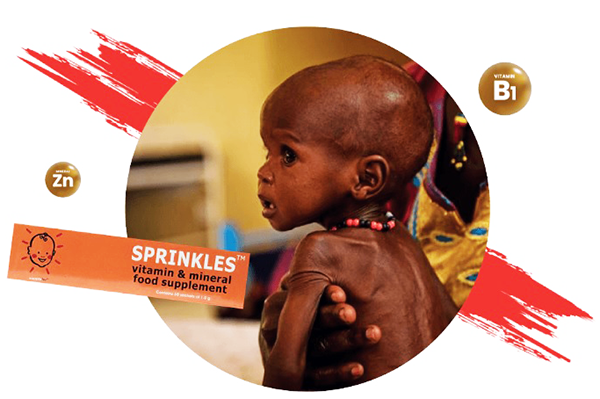Malnutrition
HomeMalnutrition

Home Fortifications
Home Fortifications or Multiple Micronutrient Powders ( MNPs) are 1 g sachets which are easy to administer along with staples. MNPs can easily be sprinkled on meals that are prepared at home or in school.
What is Multiple micronutrient powder (MNP) supplement ?
Multiple micronutrient powder (MNP) supplement is an innovative home fortification method to improve the health and well-being of women and children by combating vitamin and mineral deficiencies.
Multiple micronutrient powder (MNP) supplement is a 1-gram sachet that can be easily mixed into any food prepared at home. It does not interact with food components or significantly change the taste, color or texture of the food to which it is added.
Multiple micronutrient powder (MNP) supplement not only attempts to restore the nutritional status of preschoolers who are already undernourished, but also focuses on preventing malnutrition in mothers during pregnancy and in infants and young children during their first two years of life.
Community-based studies on Multiple micronutrient powder (MNP) supplement involving both anemic and non-anaemic children have been completed in more than eight international locations, all showing success in treating and preventing anemia.
More...PROBLEMS ASSOCIATED WITH ANEMIA :
Anemia is the world’s second leading cause of disability and thus one of the most serious global public health problems. Anemia affects over half of pre-school children and pregnant women in developing countries and at least 30-40% in industrialized countries. In poorer malaria endemic countries anemia is one of the commonest preventable causes of death in children under 5 years and in pregnant women.
Symptoms may include:
• Look pale.
• Seem moody.
• Be very tired.
• Feel dizzy or lightheaded.
• Have a fast heartbeat.
• Have jaundice (yellow skin and eyes), an enlarged spleen, and dark tea-colored pee (in hemolytic anemias).
• Slow or delayed growth and development.
The prevalence of anemia in pregnant women is more than 50 % in most states, while in young children it is approximately 70 %.
Anemia affects health, survival, productivity, income and development. Iron deficiency with or without anemia impairs cognitive development, limits attention span and shortens memory capacity, resulting in poor classroom performance, high absenteeism, and early dropout rates among schoolchildren. Iron deficiency can cause up to a 30% impairment of physical work capacity and performance and losses of up to 8% of GDP. Anemia due to iron deficiency is among the top 10 leading causes of years lost to disability in low- and middle-income countries, while anemia is the 7th leading cause of years lost to disability in women. WHO estimates that 12.8% of maternal deaths in Asia could be related to anemia.
More..




